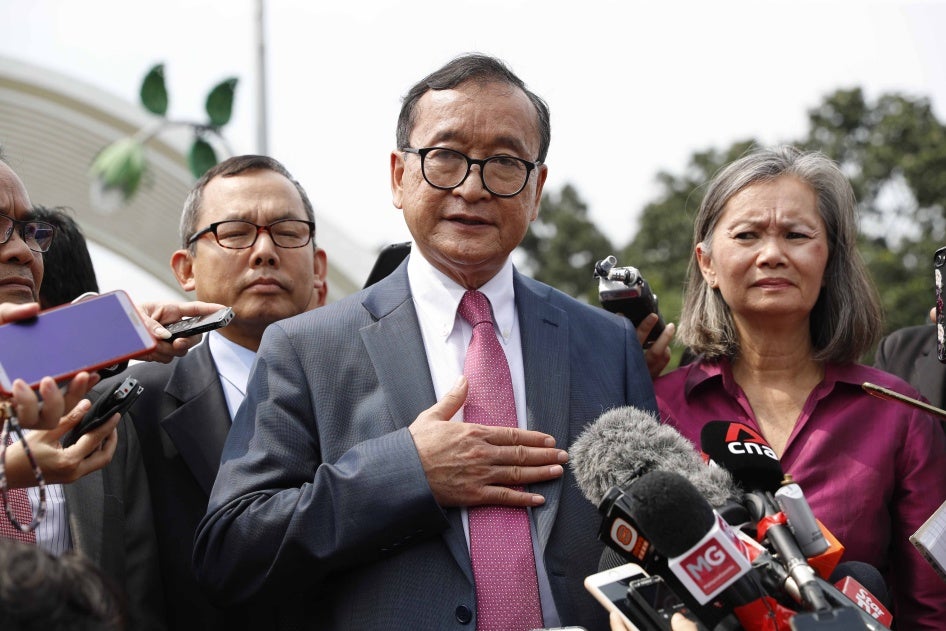(Bangkok) – A Cambodian court convicted at least 51 opposition politicians and activists on June 14, 2022, in yet another mass trial on politically motivated charges, Human Rights Watch said today. The cases are part of the government’s wider crackdown on Prime Minister Hun Sen’s political opponents.
The Phnom Penh Municipal Court convicted 51 members and activists of the dissolved Cambodia National Rescue Party (CNRP) of unsubstantiated charges of “incitement” and “conspiracy.” Twelve defendants were sentenced to eight years in prison and another 19 defendants were sentenced to six years in prison, among whom four were already detained and one was taken into custody after the verdict was read. Another 20 defendants were handed five-year suspended prison sentences. Many of the defendants were tried in absentia, with 27 of the defendants currently in exile.
“The show trial of members of an opposition party that has long since been dissolved by the courts exposes the Hun Sen government’s fear of any vestige of democracy in Cambodia,” said Phil Robertson, deputy Asia director at Human Rights Watch. “Foreign governments, the United Nations, and donors should press the government to quash these convictions and end its broad attack on Cambodia’s remaining civic and democratic space.”
The court’s judgment on nine other defendants in the mass trial remains unclear. The names of these nine defendants are not mentioned in the verdict, but the verdict also does not indicate the charges against them were dropped. The court issued detention warrants for 31 defendants.
On May 3, the court concluded the trial against the defendants, who included the exiled CNRP leaders Sam Rainsy, Eng Chai Eang, Ho Vann, and Mu Sochua, some of whom already face prison time from previous convictions in other politically motivated cases. After the verdict hearing, authorities took Cambodian and US dual national Seng Chan Theary into custody. Four other opposition politicians – Kak Komphear, Heng Chansothy, Tum Bunthorn, and York Neang – were already being held in various Phnom Penh prison facilities.
A mass trial was initiated in November 2020 against 138 former CNRP leaders and activists connected to their support for Sam Rainsy’s attempted return to Cambodia in November 2019, and the activities of the dissolved CNRP and the overseas Cambodia National Rescue Movement (CNRM). The government contends without serious evidence that the two entities are pursuing a “color revolution” against the government.
During the trial, the prosecution sought to show that the defendants were engaged in illegal political activities after the Supreme Court, which the government controls, dissolved the CNRP in November 2017. The prosecution presented activities by defendants exercising their civil and political rights as evidence of wrongdoing, such as posting screenshots on Facebook expressing support for the CNRP, its candidates, democratic principles and processes, and the right of all Cambodian citizens to return to their country.
On March 17, in a previous mass trial against opposition party members, the Phnom Penh municipal court convicted 20 opposition politicians and activists, plus one defendant’s relative, on three counts of “incitement,” “inciting military personnel to disobedience,” and “conspiracy,” and sentenced them to between 5 and 10 years in prison. While the court suspended the prison sentences of those already in pretrial detention and the defendant’s relative, the court issued arrest warrants against convicted CNRP leaders currently in exile. That case cited as wrongdoing, contrary to fundamental rights, the formation of the CNRM and social media comments criticizing the government.
The co-leader of the CNRP, Kem Sokha, also continues to face unsubstantiated, politically motivated treason charges brought against him in September 2017. His trial only recommenced in January after a two-year delay because the case was deemed not to be a priority among other pursued political cases against the opposition and activists.
The crackdown that intensified in 2017 led many opposition politicians and activists to flee the country because they feared arbitrary arrest or other forms of retaliation against them and their families. After exiled CNRP leaders announced that they would return to Cambodia in November 2019, the authorities summoned over 140 former CNRP members and activists inside the country for questioning by police or the courts. At least 78 faced politically motivated charges. While most were released on bail in December 2019, the bogus charges were never dropped, and those charged remain subject to rearrest at any time.
Human Rights Watch has documented that more than 50 political prisoners are in pretrial detention or prison in Cambodia, including political opposition members, human rights defenders, land and environmental rights activists, and journalists.
“The mass trials against political opposition members are really about preventing any electoral challenge to Prime Minister Hun Sen’s rule, but they have also come to symbolize the death of Cambodia’s democracy,” Robertson said. “By creating a political dynamic that relies on intimidation and persecution of government critics, Hun Sen demonstrates his total disregard for democratic rights.”







